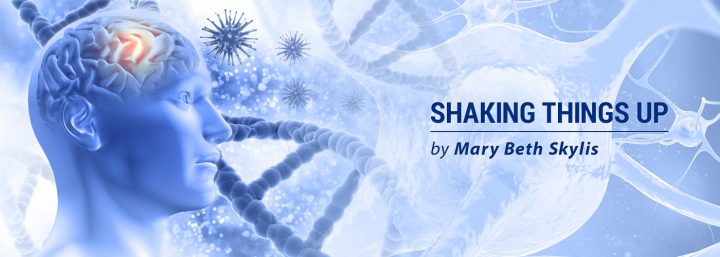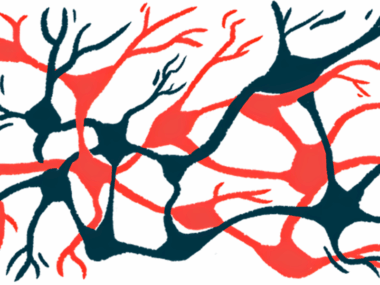Looking at Parkinson’s Potential Links to the Gut Microbiome
Written by |

I wonder if my dad’s battle with ulcerative colitis is linked to his struggles with Parkinson’s disease. Because of a series of medical complications, he’s missing his colon, a vital part of the digestion process. This affects how he digests food and medicine, which in turn affects his intestinal microbiome.
Recent research looks at how the microbiome might be linked to Parkinson’s disease. The idea seems understandable enough: You are what you eat, right? But you are what your body can process as well. Which makes me wonder: Is he alone in having both ulcerative colitis and Parkinson’s?
How might ulcerative colitis and Parkinson’s be related?
According to one recent study, those who have ulcerative colitis had a 30 percent higher risk of Parkinson’s disease than the control group. My dad seems to fall in the 30 percent group.
Not everyone with ulcerative colitis loses the colon. But my dad did, which seems to add another layer to his relationship with Parkinson’s disease. The colon helps the body during the final stage of digestion, preparing you to dispose of waste while collecting the remaining fluids.
If someone were to lose their colon to a disease like ulcerative colitis, the loss would affect the final stages of digestion. And this process likely would affect the intestinal microbiome. So, how might the intestinal microbiome relate to Parkinson’s?
A 2017 study in the journal npj Parkinson’s Disease discusses a link between the intestinal microbiome and disease: “Changes in the composition of intestinal bacterial populations have been associated with a wide array of conditions including neurological and neurodevelopmental disorders such as multiple sclerosis, autism, depression, schizophrenia and PD, and studies are beginning to explore some of the mechanisms that contribute to the powerful influence of the microbiota.”
If ulcerative colitis affects the intestinal microbiome, and the microbiome is linked with Parkinson’s disease, ulcerative colitis could be related to Parkinson’s.
Gut microbiome and disease prevention
If the gut microbiome is related to the development of certain illnesses, can those illnesses be prevented? According to a 2016 study in the journal Pharmacology & Therapeutics, “The interaction between the host and its gut microbiome is a complex relationship whose manipulation could prove critical to preventing or treating not only various gut disorders, like irritable bowel syndrome (IBS) and ulcerative colitis (UC), but also central nervous system (CNS) disorders, such as Alzheimer’s and Parkinson’s diseases.”
The npj Parkinson’s Disease study also raises the possibility of diagnosing Parkinson’s at an earlier stage by monitoring the bowels. Its authors noted: “Meta-analyses suggest that constipation is more than twice as common in people who develop PD compared to those who do not, and that constipated individuals are twice as likely to develop PD within 10 years of their evaluation.” By recognizing the relationship between the brain and the gut, we might be able to better understand the link between digestion and the central nervous system. This knowledge could help in developing a treatment at an earlier stage of the disease.
Additionally, we don’t know whether Parkinson’s might be a cause or an effect of the microbiome’s status. It’s possible that Parkinson’s affects the gut. Per the same study: “At this time, it is not clear whether the observed changes in microbiota in PD patients are an initial occurrence that contributes to the development of neurological dysfunction and degeneration, or if they emerge in response to PD-related pathology in the enteric and/or the CNSs that impairs peristaltic activity and induces inflammation.” But my dad had ulcerative colitis many years before the first signs of PD showed.
I’m interested in seeing what developments will occur as we begin to better understand Parkinson’s disease. Perhaps emerging science will discredit the relationship between the microbiome and Parkinson’s disease. But these statements and statistics seem to hint at a significant relationship between the digestive process and the nervous system.
***
Note: Parkinson’s News Today is strictly a news and information website about the disease. It does not provide medical advice, diagnosis, or treatment. This content is not intended to be a substitute for professional medical advice, diagnosis, or treatment. Always seek the advice of your physician or another qualified health provider with any questions you may have regarding a medical condition. Never disregard professional medical advice or delay in seeking it because of something you have read on this website. The opinions expressed in this column are not those of Parkinson’s News Today or its parent company, Bionews Services, and are intended to spark discussion about issues pertaining to Parkinson’s disease.






Carol
I have wondered about the same sort of things. I was diagnosed with Parkinson’s in 2013 and had a partial colon resection in 2015. I feel as though there is a connection of communication between the gastronomic system and the brain, and I too wonder how the physical changes of surgery have (and are) affecting that dialogue.
Mary Beth Skylis
I'm definitely not a scientist, but it seems like there could be a correlation. It's good to know that I'm not the only one who wonders!
Amel snv
Merci pour l'article
zizi
Thank you very much.
samiha_FS
Thank you so much for writing this.